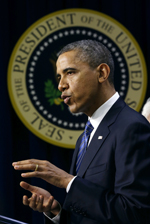Obama: Had to take gay-marriage stand
Saturday, March 2, 2013
WASHINGTON — Citing the principle of equality that drove the nation’s founding, President Barack Obama spoke out Friday against California’s ban on gay marriage and said the Supreme Court should strike it down.
A day after his administration filed a friend-of-the-court brief unequivocally calling on the justices to strike down California’s Proposition 8 ballot measure, Obama said he felt there was no way for his administration to avoid the case.
“I felt it was important for us to articulate what I believe and what this administration stands for,” the president said.
The nation has gone through the same evolution he has gone through about how gay couples should be treated under the law, said Obama, who once opposed gay marriage but changed his position last year during his reelection campaign.
“I think this is a profoundly positive thing,” Obama said in a White House news conference.
The administration’s brief outlined a broad legal argument that could ultimately be applied to other state prohibitions across the country, but stops short of the rhetoric on marriage equality Obama expressed in his inaugural address in January.
Still, it marks the first time a U.S. president has urged the high court to expand the right of gays to wed.
Obama said the brief didn’t explicitly argue that gay marriage should be made legal in every state, because the case before the court deals specifically with California.
“That’s an argument that I make, personally,” Obama said. “The court may decide that if it doesn’t apply in this case, it probably can’t apply in any case. There’s no good reason for it.”
The brief is not legally binding, though the government’s opinion could carry weight with the Supreme Court when it hears oral arguments on Proposition 8 in late March.
California is one of eight states that give gay couples all the benefits of marriage through civil unions or domestic partnerships but don’t allow them to wed. The brief argues that in granting same-sex couples those rights, California has already acknowledged that gay relationships bear the same hallmarks as straight ones.
“They establish homes and lives together, support each other financially, share the joys and burdens of raising children, and provide care through illness and comfort at the moment of death,” the administration wrote.
The brief marks the president’s most expansive view of gay marriage and signals that he is moving away from his previous assertion that states should determine their own marriage laws. Obama, a former constitutional law professor, signed off on the administration’s legal argument last week after lengthy discussions with Attorney General Eric Holder and Solicitor General Donald Verrilli.
In a statement after the filing, Holder said that “the government seeks to vindicate the defining constitutional ideal of equal treatment under the law.”
Obama’s position, if adopted by the court, would likely result in gay marriage becoming legal in the seven other states: Delaware, Hawaii, Illinois, Nevada, New Jersey, Oregon and Rhode Island.
In the longer term, the administration urges the justices to subject laws that discriminate on sexual orientation to more rigorous review than usual, as is the case for claims that laws discriminate on the basis of race, sex and other factors.
The Supreme Court has never given gay Americans the special protection it has afforded women and minority groups. If it endorses such an approach in the gay-marriage cases, same-sex marriage bans around the country could be imperiled.
Despite the potentially wide-ranging implications of the administration’s brief, it still falls short of what gay-rights advocates and the attorneys who will argue against Proposition 8 had hoped for. Those parties had pressed the president to urge the Supreme Court to not only overturn California’s ban but also declare all gay-marriage bans unconstitutional.
Still, marriage-equality advocates publicly welcomed the president’s legal positioning.
“Obama again asserted a bold claim of full equality for gay Americans, this time in a legal brief,” said Richard Socarides, an attorney and advocate. “If its full weight and reasoning are accepted by the Supreme Court, all anti-gay marriage state constitutional amendments will fall, and quickly.”
The National Organization for Marriage, a leading supporter of the California ban, rejected Obama’s arguments. Spokesman Thomas Peters said he expects the Supreme Court to uphold the votes of more than 7 million Californians to protect marriage, spokesman Thomas Peters said.
Front Section, Pages 3 on 03/02/2013
